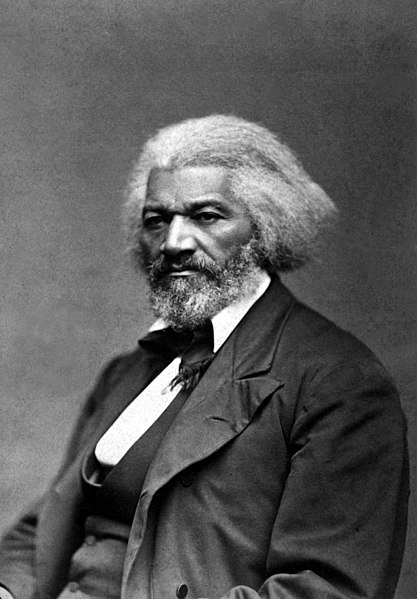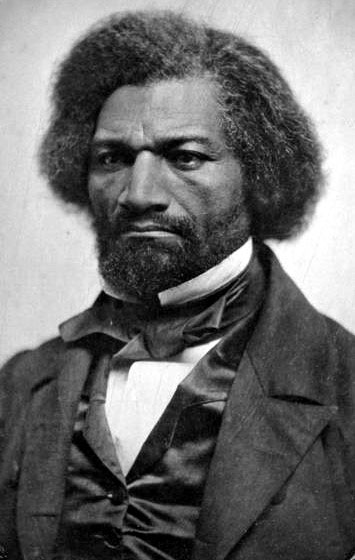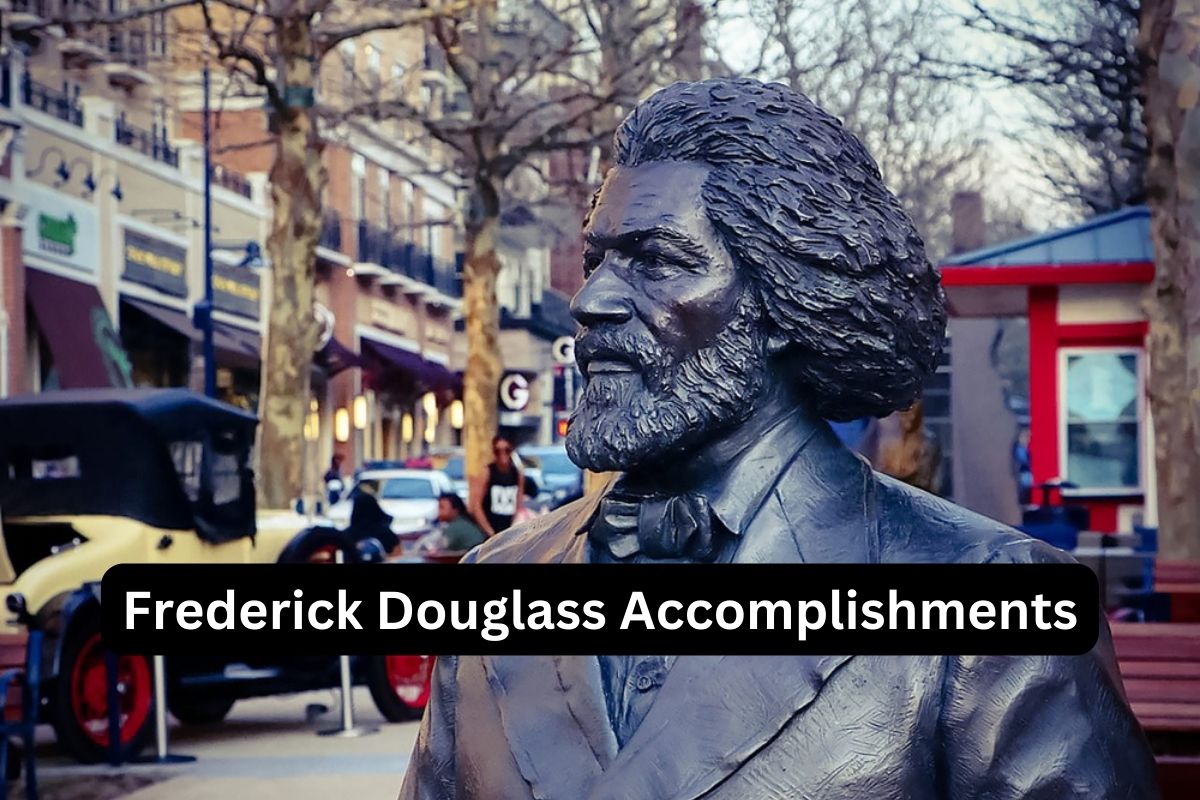Frederick Douglass was born into slavery around 1818 in Talbot County, Maryland. He endured a childhood of hardship and brutality before successfully escaping to freedom in 1838. Douglass became a prominent abolitionist, using his powerful oratory skills and writing to advocate for the immediate end of slavery.
He published his influential autobiography, “Narrative of the Life of Frederick Douglass, an American Slave,” in 1845, which brought attention to the harsh realities of slavery.
Douglass founded an abolitionist newspaper, the North Star, and played a crucial role in recruiting African American soldiers during the Civil War.
He was also an advocate for women’s rights and held government positions, breaking barriers for African Americans. Douglass dedicated his life to fighting for racial equality and remains an enduring symbol of freedom and justice.
Accomplishments of Frederick Douglass
1. Escaped from slavery
Frederick Douglass’s escape from slavery was a remarkable feat that required immense courage and determination. Born into slavery in Talbot County, Maryland, in 1818, Douglass endured years of physical and mental abuse.
Also Read: Facts About Frederick Douglass
At the age of 20, he made a daring decision to escape to freedom. Disguised as a sailor and armed with forged identification papers, he boarded a train and traveled to the North, eventually settling in New Bedford, Massachusetts.
His escape marked a turning point in his life and set the stage for his remarkable achievements as an abolitionist and advocate for social justice.

2. Leader in the abolitionist movement
After gaining his freedom, Frederick Douglass became one of the leading voices in the abolitionist movement. He dedicated his life to advocating for the immediate and total abolition of slavery.
Douglass believed that freedom could only be achieved through active resistance and the dismantling of the oppressive institution of slavery. His powerful speeches and writings, filled with firsthand accounts of the horrors of slavery, resonated with audiences across the United States and beyond.
Douglass played a pivotal role in organizing and mobilizing support for the abolitionist cause, working alongside prominent figures such as William Lloyd Garrison and Harriet Tubman.
3. Published influential autobiography
In 1845, Frederick Douglass published his groundbreaking autobiography, titled “Narrative of the Life of Frederick Douglass, an American Slave.” The book provided a firsthand account of his life in slavery, detailing the brutalities he experienced and witnessed.
The narrative vividly described the physical abuse, emotional torment, and dehumanization that enslaved individuals endured. Douglass’s autobiography became an instant bestseller and a powerful tool for the abolitionist movement.
Also Read: Timeline of Frederick Douglass
It not only exposed the realities of slavery to a wider audience but also humanized the enslaved population, challenging prevailing racist narratives and inspiring empathy and outrage.
The book’s success brought international attention to Douglass and solidified his position as a leading abolitionist and advocate for human rights.
4. Renowned orator and writer
Frederick Douglass possessed exceptional oratory skills and became renowned for his powerful speeches. He captivated audiences with his eloquence, impassioned delivery, and commanding presence.
Douglass’s speeches were not only a means of communication but also a form of activism, stirring emotions, challenging societal norms, and demanding justice. His ability to articulate the moral, political, and human rights arguments against slavery made him a sought-after speaker at abolitionist gatherings, conventions, and rallies.
Furthermore, Douglass’s talents as a writer shone through his speeches, articles, and editorials, where he articulated his ideas, advocated for freedom and equality, and critiqued the oppressive systems of his time.

5. Founded an abolitionist newspaper
In 1847, Frederick Douglass founded the North Star newspaper, which later became known as Frederick Douglass’ Paper. As its editor, he used the publication as a powerful platform to disseminate his anti-slavery views, expose the injustices of slavery, and advocate for racial equality.
The newspaper played a significant role in uniting and mobilizing abolitionist efforts. It provided a platform for African Americans to voice their perspectives and concerns, highlighted the achievements of prominent African Americans, and disseminated news related to the abolitionist cause.
Through his newspaper, Douglass engaged in intellectual discourse, promoted the rights and dignity of African Americans, and helped shape public opinion in favor of emancipation and equality.
6. Advocate for women’s rights
Frederick Douglass was an early advocate for women’s rights and recognized the importance of gender equality in the broader struggle for social justice. He believed that the fight for emancipation and equal rights extended to women as well.
Douglass attended the historic Seneca Falls Convention in 1848, where he gave a powerful speech in support of women’s suffrage. His involvement in the convention marked a significant step toward the inclusion of women’s rights in the broader agenda of social reform.
Douglass continued to advocate for women’s suffrage throughout his life, recognizing the interconnectedness of different forms of oppression and the need for collective liberation.
His support for women’s rights contributed to the advancement of the feminist movement and the eventual achievement of women’s suffrage in the United States.
7. Encouraged African American soldiers to join Union Army
During the American Civil War, Frederick Douglass played a crucial role in advocating for African Americans to enlist in the Union Army. He believed that military service would not only contribute to the Union’s cause but also empower African Americans and advance their fight for freedom and civil rights.
Douglass used his influence and persuasive abilities to deliver speeches and publish articles encouraging African American men to join the war effort. He emphasized that military service would challenge the prevailing racist beliefs and demonstrate the valor and patriotism of African Americans.
As a result of his efforts and those of other abolitionists, thousands of African American soldiers and regiments were formed, making significant contributions to the Union’s victory.
8. Held government positions
Frederick Douglass’s accomplishments extended beyond his activism and advocacy work. He broke barriers by holding various government positions, becoming one of the first African Americans to attain high-ranking roles in the U.S. government.
From 1877 to 1881, Douglass served as the U.S. Marshal for the District of Columbia, where he ensured the enforcement of federal laws and provided leadership in the nation’s capital. His appointment as Marshal represented a significant milestone in African American political representation.
Additionally, from 1889 to 1891, Douglass served as Minister to Haiti, representing the United States in diplomatic relations with the Caribbean nation. His government positions demonstrated his intellectual prowess, leadership skills, and the recognition of his contributions to the nation.
9. Fought for racial equality
Throughout his life, Frederick Douglass was a tireless advocate for racial equality. He fought against the deeply entrenched systems of racism, discrimination, and inequality that permeated American society.
Douglass used his platform to denounce segregation, racial violence, and the denial of civil rights to African Americans. He argued passionately for equal treatment under the law, educational opportunities, and economic justice.
Douglass believed in the inherent dignity and worth of every individual, regardless of race, and dedicated his efforts to dismantling the structures that perpetuated racial injustice. His unwavering commitment to racial equality continues to inspire activists and advocates to this day.
10. Enduring legacy as a symbol of freedom and justice
Frederick Douglass’s legacy extends far beyond his own lifetime. He remains an iconic figure, celebrated as a symbol of freedom, resilience, and the pursuit of justice. His writings, speeches, and activism continue to inspire generations of individuals fighting for civil rights and social justice.
Douglass’s profound impact on American society is evident in the recognition of his contributions through various memorials, statues, and educational institutions. His life and work serve as a reminder of the power of individual agency, the importance of education and intellectual pursuits, and the necessity of confronting injustice to create a more equitable society.
